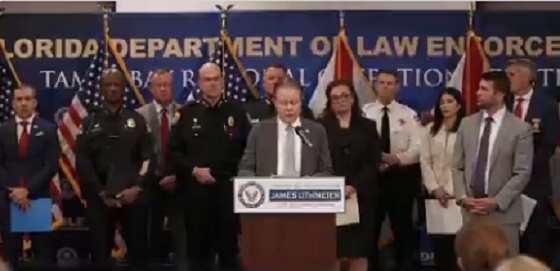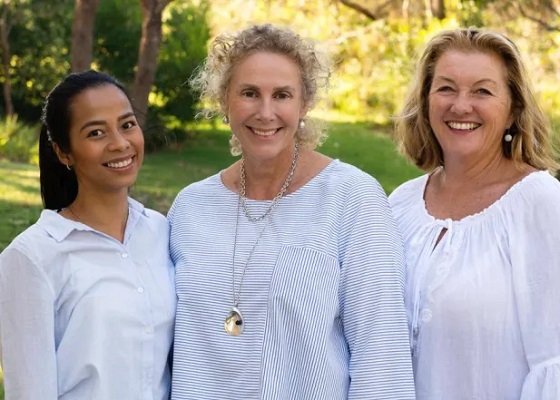2025 Federal Election
Conservative MP Leslyn Lewis warns Canadian voters of Liberal plan to penalize religious charities

From LifeSiteNews
A Liberal government plan for pro-life and religious groups to be stripped of their tax charity status is an ‘assault’ on people’s faith, MP Leslyn Lewis said.
Canadian Conservative pro-life MP Leslyn Lewis said a plan supported by Mark Carney’s Liberal government that calls for pro-life and religious groups to be stripped of their tax charity status should be an election issue as it’s an “assault” on people’s faith.
“The Liberal plan to revoke the charitable status of religious organizations is an assault on people of faith across Canada,” Lewis wrote on X last week.
Lewis linked her post to an opinion piece published in the Niagara Independent by Lee Harding with the headline “Canada’s sleeper election issue: the loss of charitable status for religious organizations.”
Harding observed that the “potential loss of charitable status for religious charities might be the biggest sleeper issue in the federal election.”
“The Liberal government proposed the change and only Conservatives opposed,” Harding said.
Lewis noted that 40 percent of the 85,600 charities in Canada are religious organizations.
“These are organizations that feed the hungry, support the elderly, rally around people in crisis, provide addiction recovery services – and this is just the tip of the iceberg,” she wrote.
“It is quite honestly disgusting that the Liberals would try to sneak in this unconscionable attack in a Finance Committee report, just before Parliament prorogued.”
She noted how a recent Cardus study shows that if these charities lose their tax status “Canadians would lose $16.5B in services.”
Canadians will head to the polls on April 28. Harding noted how “One needn’t be religious to see the harm in such uncharitable changes to Canada’s charitable sector.”
“Fortunately, Canadians can vote down this misguided attack on religious charities. Whether they do so is up to them.”
Last month, the Conservative Party of Canada launched a petition blasting a recent finance committee recommendation supported by Carney that calls for pro-life and religious groups to have their charity tax status revoked.
The Finance Committee’s pre-budget report proposal released in December 2024 by the all-party Finance Committee suggested that legislation is needed to strip pro-life pregnancy centers and religious groups of their charitable status.
The legislation would amend the Income Tax Act and Income Tax. Section 429 of the proposed legislation recommends the government “no longer provide charitable status to anti-abortion organizations.”
All federal parties except for the Conservatives under Pierre Poilievre support the finance report’s recommendation.
Canada’s Catholic bishops have blasted the report’s recommendations and have urged the Liberal federal government to not proceed with any legislation that would target pro-life groups of religious organizations’ charity tax status.
The good news is that in light of former Prime Minister Justin Trudeau’s shutting of Parliament in order to step down from office, already planned legislation to strip pro-life pregnancy centers of charity status is on pause, at least for now.
Despite the reality that Poilievre is also pro-abortion, the former Trudeau now Carney Liberal government has in recent months ramped up his abortion rhetoric on social media in a seeming bid to rally its base, consistently boasting about his government’s desire to make killing a child in the womb easier than ever. Trudeau also repeatedly bragged about his pro-abortion record in the House of Commons.
2025 Federal Election
NDP’s collapse rightly cost them official party status

This article supplied by Troy Media.
 By Michael Taube
By Michael Taube
Official party status requires 12 seats. The NDP got seven. End of story
Rules are rules.
That, in a nutshell, is why the NDP wasn’t granted official party status in the House of Commons on Monday. Prime Minister Mark Carney and the
Liberals, to their credit, made the right decision.
Let’s examine why.
The 1963 Senate and House of Commons Act passed an amendment that gave an annual allowance to party leaders other than the prime minister and
leader of the Opposition. In doing so, the Canadian government had to establish what constitutes a “political party.” The definition they came up with was a sensible one: it had to have a “recognized membership of 12 or more persons in the House of Commons.”
This important amendment is still used today.
The NDP fell from 24 to a paltry seven seats in last month’s federal election. (There are a total of 343 seats in the House of Commons.) They finished with 1,234,673 votes, or 6.29 per cent, which was behind the Liberals, Conservatives and Bloc Québécois. Party leader Jagmeet Singh, who had represented the former Burnaby South riding since 2019, finished a distant third in the newly created Burnaby Central riding and resigned.
The NDP’s seven seats is well below the 12-seat requirement needed for official party status. This means Canada’s socialist alternative won’t be able to ask questions in the House of Commons and will lose out on money for research purposes.
Or, to put it another way, they’re plumb out of luck.
Hold on, some people said. They pointed out that the NDP’s seat count and popular vote only plummeted because many progressive voters backed Carney and the Liberals as the best option to counter U.S. President Donald Trump and his tariffs. They felt that the NDP’s long history as a champion for unions and the working class should count for something. They suggested there should be an exception to the rule.
Guess what? They’re wrong.
This is the worst election result in the party’s history. Even its predecessor, the Co-operative Commonwealth Federation (CCF), did marginally better in its first campaign. The CCF won seven out of 245 seats—and earned 410,125 votes, or 9.31 per cent—in the 1935 election. Party leader J.S. Woodsworth, who had represented the riding of Winnipeg North Centre as an Independent Labour MP since 1925, comfortably held his seat.
Meanwhile, this won’t be the first time they’ve ever lost official party status.
The NDP dropped from 43 to nine seats in the 1993 election. It was a dismal showing, to say the least. There was a suggestion at the time that then-party leader Audrey McLaughlin, the first woman to lead a party with political representation in Canada’s House of Commons, deserved a better fate. While the NDP certainly came closer to achieving the 12-seat requirement in this particular election, Prime Minister Jean Chrétien and the Liberals decided against granting them official party status.
Why? As I mentioned earlier, rules are rules.
Then again, British pilot Harry Day notably told his fellow flying ace Douglas Bader in 1931, “You know my views about some regulations—they’re written for the obedience of fools and the guidance of wise men.”
Does this mean that individuals and organizations who follow rules are, in fact, fools? Not at all. While certain rules in a liberal democratic society can range from slightly questionable to utterly ridiculous, they’re usually put in place for a specific purpose.
In the case of the House of Commons, it’s to ensure that a bar has been set with respect to political representation. Is 12 seats the right number? That’s difficult to say. It certainly prevents small protest parties and one-issue parties that unexpectedly win a tiny number of seats in an election from acquiring power and status right off the bat. They need to win more seats and grow in size and stature to reach a point of respectability. Most of them never reach this point and disappear while others float in a constant state of mediocrity like the Green Party of Canada. ’Tis the nature of the political beast.
One final point. If Singh and the NDP had reached double digits in total number of seats in 2025, a solid case could have been made in favour of official party status. If they had finished with 11 seats, it would have almost been a lock. Neither scenario ultimately materialized, which is why Carney and the Liberals did exactly what they did.
Michael Taube is a political commentator, Troy Media syndicated columnist and former speechwriter for Prime Minister Stephen Harper. He holds a master’s degree in comparative politics from the London School of Economics, lending academic rigour to his political insights.
Troy Media empowers Canadian community news outlets by providing independent, insightful analysis and commentary. Our mission is to support local media in helping Canadians stay informed and engaged by delivering reliable content that strengthens community connections and deepens understanding across the country.
2025 Federal Election
Judicial recounts give Conservatives 2 more seats, keeping Liberals short of majority

From LifeSiteNews
After a judicial recount, Conservative candidate Kathy Borrelli has officially won over Liberal incumbent Irek Kusmierczyk, in the Ontario riding of Windsor-Tecumseh-Lakeshore.
Judicial recounts from the 2025 federal election have given the Conservative Party two new seats, with one candidate winning by just four votes.
After a judicial recount, Conservative candidate Kathy Borrelli has officially won over Liberal incumbent Irek Kusmierczyk, in the Ontario riding of Windsor-Tecumseh-Lakeshore.
Borrelli got 32,090 votes, with Kusmierczyk getting 32,086 votes, and NDP candidate Alex Ilijoski getting 4,240 votes.
In the Newfoundland riding of Terra Nova-The Peninsulas, Conservative candidate Jonathan Rowe beat out Liberal Anthony Germain by just 12 votes after a recount with the initial result showing a Liberal victory.
The new election results mean the Conservatives now have 144 seats with the Liberals at 169, three short of a majority.
Judicial recounts are automatically triggered when the margin of victory for a candidate is less than 0.1 percent of valid votes.
While these recounts have favored the Conservatives, others have gone in the Liberal Party’s favor.
A May 16 judicial recount switched the southern Ontario riding of Milton East-Halton Hills South to the Liberals with a 21-vote victory over the Conservatives.
Overall, the election results have been a big blow to the Conservative Party, which on top of losing the election also saw its leader, Pierre Poilievre, fail to win his long-held seat. However, Poilievre is expected to run in a yet-to-be-announced by-election in Alberta to reclaim a seat in Parliament.
-

 Bruce Dowbiggin18 hours ago
Bruce Dowbiggin18 hours agoWhat Connor Should Say To Oilers: It’s Not You. It’s Me.
-

 Business19 hours ago
Business19 hours agoFederal fiscal anchor gives appearance of prudence, fails to back it up
-

 Business17 hours ago
Business17 hours agoThe Passage of Bill C-5 Leaves the Conventional Energy Sector With as Many Questions as Answers
-

 Alberta15 hours ago
Alberta15 hours agoAlberta poll shows strong resistance to pornographic material in school libraries
-

 Business13 hours ago
Business13 hours agoCanada should already be an economic superpower. Why is Canada not doing better?
-

 Crime14 hours ago
Crime14 hours agoFlorida rescues 60 missing kids in nation’s largest-ever operation
-

 Banks16 hours ago
Banks16 hours agoScrapping net-zero commitments step in right direction for Canadian Pension Plan
-

 Also Interesting2 days ago
Also Interesting2 days agoDodgers Hitting Their Stride: Winning Streak Sets Stage for Key Matchups



